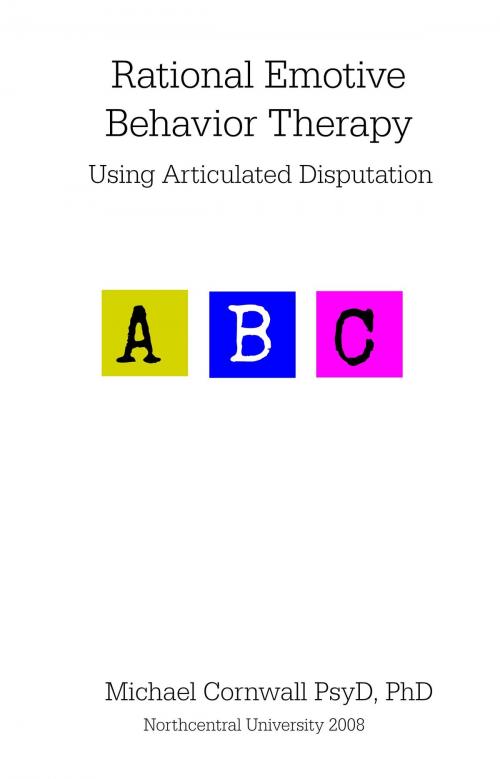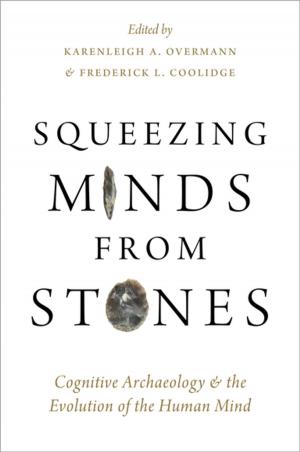Rational Emotive Behavior Therapy Using Articulated Disputation
Nonfiction, Health & Well Being, Psychology, Cognitive Psychology| Author: | Michael Cornwall | ISBN: | 9781370528516 |
| Publisher: | Michael Cornwall | Publication: | July 8, 2017 |
| Imprint: | Smashwords Edition | Language: | English |
| Author: | Michael Cornwall |
| ISBN: | 9781370528516 |
| Publisher: | Michael Cornwall |
| Publication: | July 8, 2017 |
| Imprint: | Smashwords Edition |
| Language: | English |
Rational Emotive Behavior therapy (REBT) is a unified theory of psychotherapy, focusing on the examination of attitudes and beliefs as the basis for enhancing competence in Emotional Intelligence (EI) and Social Problem Solving (Emotional Intelligence). The therapist’s dexterity at implementing the level of assimilative integration required for the client’s effective use of REBT, however, may result in therapeutic weaknesses.
This study investigated the use of Think Aloud (TA) as a way addressing the perceived weaknesses in the REBT model’s transferability from the clinical to real world experiences.
Thirty-five participants, ranging in age from 18-66, participated in the study. Twenty-two (68.8%) were Female and 10 (31.3%) were Male. Three individuals declined to provide demographic information. Twenty-eight European Americans (87.5%) and four African Americans (12.5%) participated.
Results showed an improvement in the training group's EI and Emotional Intelligence at Post-test (M = 108.29, SD = 12.25) compared to Pre-test (M = 100.29, SD = 13.97). An ANOVA failed to reveal a significant between-subjects main effect by Group, F (1, 33) = 0.00, p > .05 (partial η2 = .00, power = .05).
These data suggest there was no overall difference between the training and control groups on EI or Emotional Intelligence. There was an overall main effect by Time. This increase was significant only for the Training group. Improvement did not differ by Age or Sex on Post-test scores.
An assumption could be drawn that a continual increase in EI and Social Problem Solving scores may have been realized, if the study had continued for a longer period of Time.
Rational Emotive Behavior therapy (REBT) is a unified theory of psychotherapy, focusing on the examination of attitudes and beliefs as the basis for enhancing competence in Emotional Intelligence (EI) and Social Problem Solving (Emotional Intelligence). The therapist’s dexterity at implementing the level of assimilative integration required for the client’s effective use of REBT, however, may result in therapeutic weaknesses.
This study investigated the use of Think Aloud (TA) as a way addressing the perceived weaknesses in the REBT model’s transferability from the clinical to real world experiences.
Thirty-five participants, ranging in age from 18-66, participated in the study. Twenty-two (68.8%) were Female and 10 (31.3%) were Male. Three individuals declined to provide demographic information. Twenty-eight European Americans (87.5%) and four African Americans (12.5%) participated.
Results showed an improvement in the training group's EI and Emotional Intelligence at Post-test (M = 108.29, SD = 12.25) compared to Pre-test (M = 100.29, SD = 13.97). An ANOVA failed to reveal a significant between-subjects main effect by Group, F (1, 33) = 0.00, p > .05 (partial η2 = .00, power = .05).
These data suggest there was no overall difference between the training and control groups on EI or Emotional Intelligence. There was an overall main effect by Time. This increase was significant only for the Training group. Improvement did not differ by Age or Sex on Post-test scores.
An assumption could be drawn that a continual increase in EI and Social Problem Solving scores may have been realized, if the study had continued for a longer period of Time.















